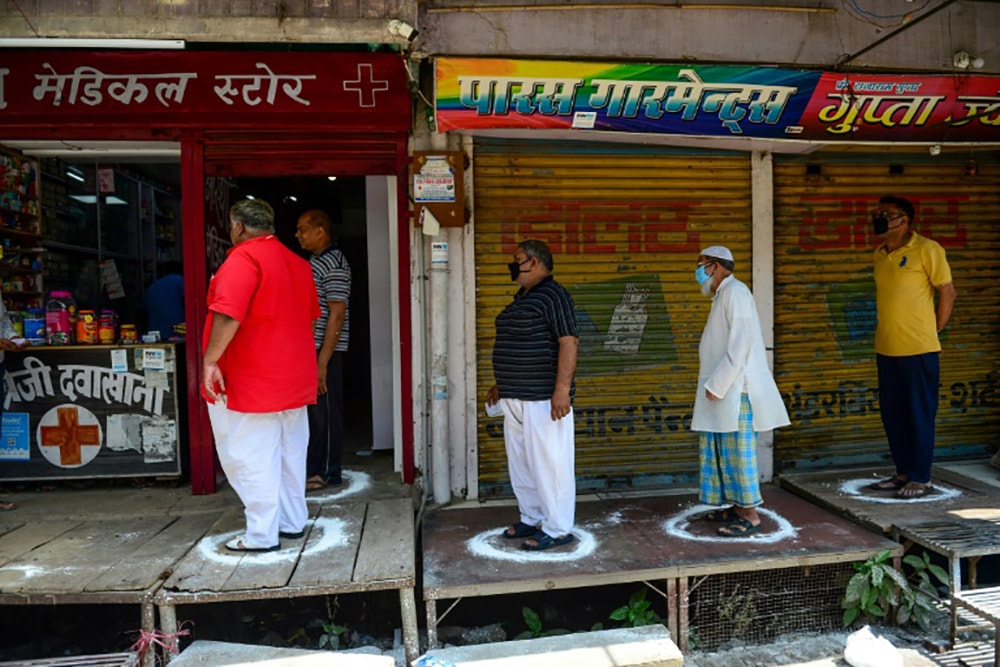Covid-19 and the 'nightmare scenario' Bill Gates once warned about
(Baonghean) - For many years, Microsoft founder and philanthropist Bill Gates has repeatedly warned about the risks posed by global epidemics. In 2015, he even emphasized that the most terrible threat facing humanity was not nuclear war, but a pandemic. This week, the "nightmare scenario" happening in almost every country in the world seems to confirm his assessment.
Unwanted “Title”
It has been a terrible week for humanity, with more than half a million people in many countries now infected with the novel coronavirus (Covid-19), leaving many healthcare systems, even in the most prosperous countries, stunned and paralyzed. The wave of infection has forced one government after another to issue widespread lockdown orders, disrupting the daily lives of billions of people on the planet.
In the US, on March 26, people were shocked to realize that they had “surpassed” a number of “hot spots” to receive the sad “title” of being the country with the most cases of the virus causing acute respiratory infections in the world. More than 82,000 cases in this country have tested positive for Covid-19, higher than the number in Italy - the country with the most deaths, and China - where the virus was first detected in December 2019 in Wuhan city, Hubei province.
 |
| People line up to get tested for Covid-19 in New York, USA. Photo: AFP |
Fears of a global recession, let alone a crisis, are growing, prompting leaders of the Group of 20 (G20) major economies to hold online talks on Thursday to respond to the crisis, pledging a “united front” to fight the outbreak, along with a huge financial injection package.
In a statement, the global economic giants affirmed: “This virus knows no borders. We are injecting more than $5 trillion into the global economy, part of targeted fiscal policy, economic measures, and insurance plans to respond to the social, economic and financial impacts of this pandemic.”
In addition, they also made a commitment to provide “strong” support to developing countries, which are the places where Covid-19 is likely to rage in the coming time after having devastated China and Europe. However, according to analysts, the solidarity promised by the G20 is actually unlikely to be as expected, because the two leading economies, the US and China, have not yet stopped “back and forth” criticizing each other about how to respond to the crisis called Corona.
 |
| The number of deaths from Covid-19 in Spain has surpassed that of China. Photo: AFP |
In the European Union (EU), the situation is not much better, when Italy and Spain - the country with the second highest number of deaths in the world, have spoken out against the draft economic plan of the 26-member bloc, arguing that it is not enough, too weak to cope with the situation. Italian Prime Minister Giuseppe Conte affirmed the desire for a "strong and sufficient" financial response to be able to deploy "new financial instruments truly adapted to a war" like the current one.
Where is the peak of the epidemic?
Shocked by the rapid spread of the disease caused by the Corona virus in Italy, France took drastic measures to contain the virus and began a lockdown on March 17. However, by March 26, the country had recorded 365 more deaths, the highest number in a single day. Notably, among the unfortunate victims, there was a 16-year-old girl, considered a rare case of a young person having to "surrender" to a virus strain that is still considered to be very dangerous for the elderly.
In a recent statement to the press, Mr. Jerome Salomon - French health official said that it is difficult to calculate the peak of the epidemic. However, he still seemed quite optimistic when he commented that the people currently infected with the disease were already infected before the lockdown took effect.
“Now, as contact has decreased and people are less likely to go out, the number of infections will increase less. So we hope that next week we will have fewer people infected and fewer people needing to be hospitalized.”
 |
| Some scientists in France are researching ways to deal with the Corona virus. Photo: AFP |
This is not just a concern in France, as medical facilities are under pressure, with medical staff in developed countries like Italy and Spain having to make tough choices when taking on responsibilities in the midst of the pandemic. Sara Chinchilla, a pediatrician at a hospital near Madrid, said: “If there are five patients and only one bed left, I will have to choose who gets treated. People who could have been saved are dying because there is no more space in the intensive care unit.”
Or in the UK, the National Health Service also said that hospitals in the capital London are facing "continuous tsunamis" of large numbers of critically ill patients due to Covid-19, even though the foggy country imposed a lockdown this week.
As for New York, the US coronavirus “hotspot,” state officials are hoping to stem the surge in cases, as the city is already in a state of needing twice as many hospital beds as it currently has. As Governor Andrew Cuomo has warned, almost any realistic scenario would overwhelm the capacity of the current health care system.
Is it too late to act fast?
The pandemic has quickly caused terrible losses to the global economy. Even the world's number 1 economy, the US, last week recorded 3.3 million people applying for unemployment benefits - a record number ever. A series of people lost their jobs in industries from food to retail, transportation... because nearly half of the country had to close "non-essential" businesses. All of these are just initial numbers, the situation is likely to get much worse in the coming time, although the US Senate has been moving to pass a $2 trillion relief package.
 |
| People line up in pre-drawn circles to maintain social distancing as they queue outside a pharmacy in India. Photo: AFP |
The global lockdown has also had a marked impact on India’s massive population, while in Russia all international flights have been suspended and the mayor of Moscow has ordered cafes, shops and parks to close. Millions of Tokyo residents have been ordered to stay at home, just days after the shock news that the 2020 Summer Olympics were postponed to next year. Most foreign nationals are also being barred from China, as Beijing fears that imported cases will undermine its hard-won success in reducing domestic infections.
The impact of the new virus is reaching beyond the frontline medical staff, threatening billions of people currently trying to stay home, at risk of what experts say is long-term psychological damage.
In recent days, a rare ray of hope has appeared when in major epidemic areas such as Italy or Spain, the number of new infections per day is showing signs of slowing down. It cannot be denied that these numbers are "encouraging signs" as commented by the World Health Organization, but along with that, we also need to raise vigilance, because it is too early to predict whether the pandemic has peaked or not. Do not be subjective, take the situation lightly, because if everything goes as the somewhat gloomy forecast according to research by the Royal College of England, 1.8 million people on the planet may no longer see the sunlight, even if humanity tries to act quickly to prevent Covid-19.

